Each year, PGN curates a list of the year’s top stories. We’re highlighting topics and stories that captivated our community and gained wider attention in 2023. The year was marked by protests — including celebrations of joyful resistance and rallies that advocated for queer youth. It was an election year — and Pennsylvania saw LGBTQ+ people step into leadership. Other progress was made in anti-discrimination efforts in both legislation and healthcare policy. And questions still linger about an ongoing investigation about a local murder.
Mayoral candidates supported drag performers
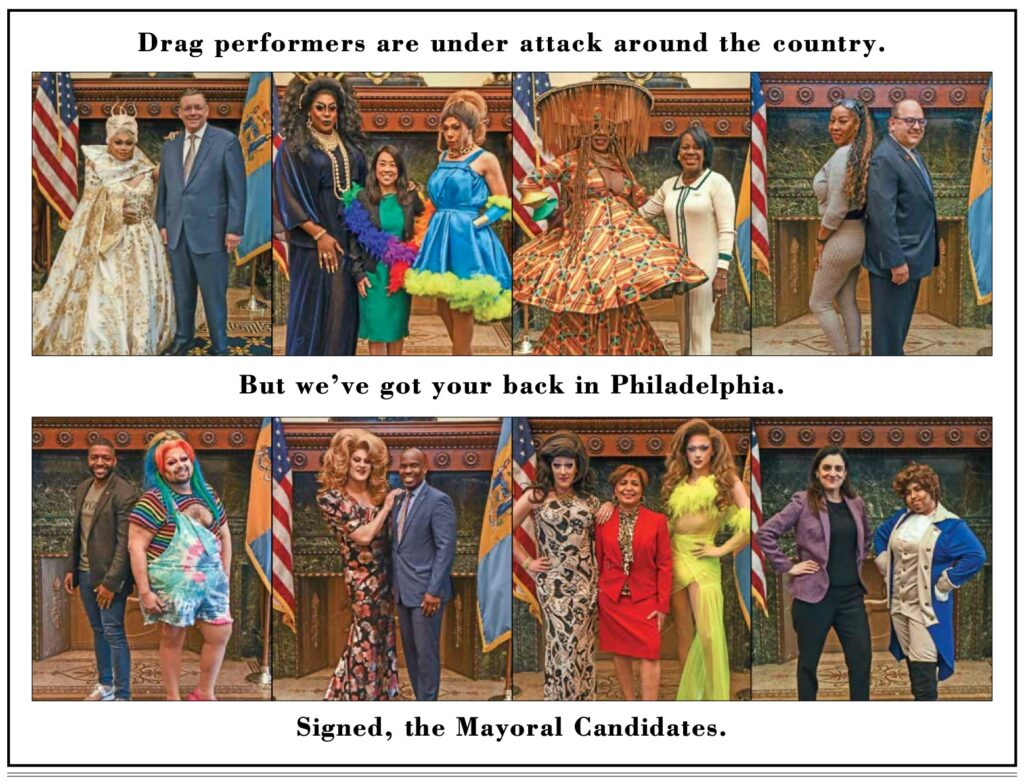
In March, eight of the city’s mayoral candidates met with drag artists from around the city to share a message of support in the face of drag bans throughout the US. The candidates posed for a photo with the performers, which PGN published with a message that read, “Drag performers are under attack around the country. But we’ve got your back in Philadelphia. Signed, the Mayoral Candidates.”
Cherelle Parker, who later won the election, was present. She said she was “pissed off” by anti-drag legislation. “There is so much diversity,” said Mayor-elect Parker. “I’m a Black woman. I know what it’s like to be put in a box because I’m Black and then I’m a woman.”
“But if you look at the variations of style and grace and focus — on the costumes, the design, the makeup, the hair — everyone is different and beautiful in their own right, and that’s why it was important for me,” she added. “So people could see us all together.”
PGN’s photoshoot took place soon after disruptions of Drag Queen Storytime events by conservative groups in the Philadelphia suburbs — during a time when the influence of right-wing groups like Moms for Liberty was growing on conservatives.
Trans students protest to advocate for their rights
This year, a record 589 anti-trans bills have been introduced across the country. About half of the bills introduced remain active, and 85 have already passed. On April 25, trans students and their allies took part in a staged walkout to raise awareness about this legislation — including three bills in the Pennsylvania house — bills 138, 216 and 319.
If passed, these bills — which are also still active — would restrict young people’s access to healthcare, school sports, queer-affirming education and privacy.
Participants gathered at City Hall to hear speeches from youth organizers, who spoke about the negative impact of anti-trans rhetoric on their own mental health, difficulties in planning for the futures or keeping themselves safe given today’s anti-trans climate, and the power of self-acceptance. Most of the young people present were not old enough to vote and used this opportunity as a means to ask their representatives and other adults to take action.
Students chanted as they circled City Hall before concluding the march at the Philadelphia School District Building.
In addition to concerns raised about legislation, youth asked for Philadelphia school staff to receive stronger training to ensure they could better respect and support LGBTQ+ students. They also ask for equitable access to gender-neutral facilities, since many buildings offer limited options for bathrooms, locker rooms, and other spaces compared to gender-segregated choices on campuses.
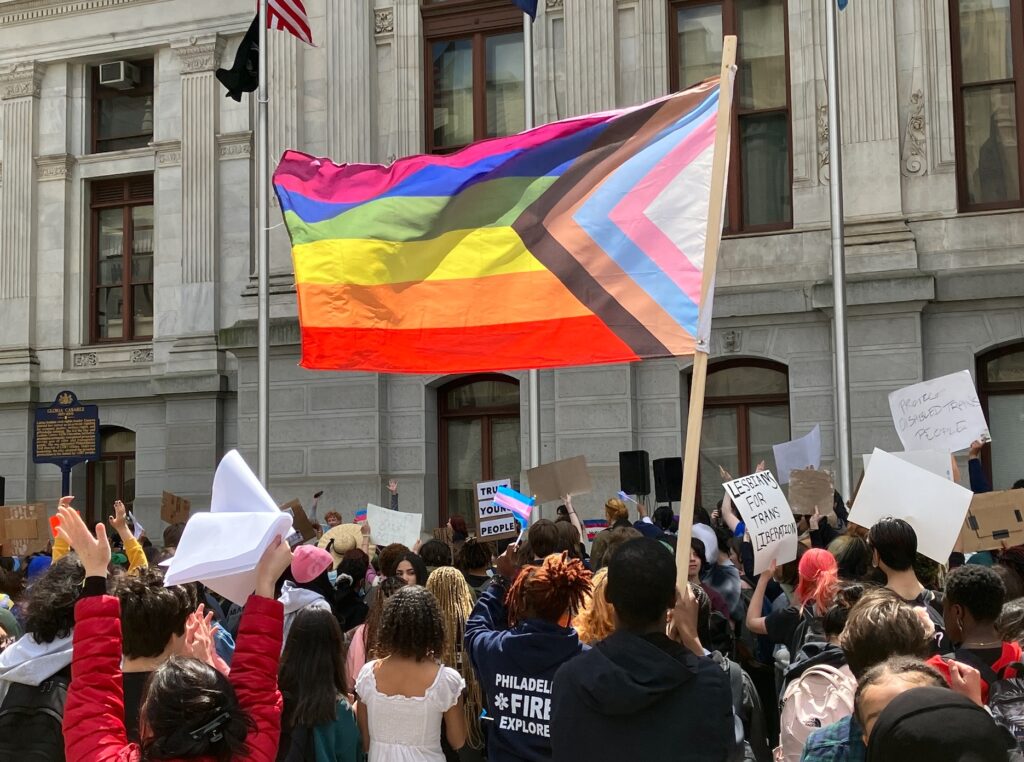
Legislative efforts promote nondiscrimination
The Pennsylvania House of Representatives passed the Fairness Act in May, which now awaits confirmation by the Senate. It’s the first time the amendment has passed either legislative chamber since it was introduced 47 years ago. Two Republicans joined Democrats to make the win — a 102-98 vote — possible.
The amendment would extend protections granted by the Pennsylvania Human Relations Act of 1955, which safeguards some groups of marginalized people from discrimination in employment, housing, commercial property, education and public accommodations. The application of the current Pennsylvania Human Relations Act includes a few additions and exceptions, but it generally aims to protect people from discrimination based on race, color, age (over 40), sex, ancestry, national origin, religion, and disability. If passed by the Senate, protections would extend to include sexual orientation and gender identity or expression to its list of protected classes.
In June, the Pennsylvania Human Relations Commission (PHRA) announced new regulations which clarify definitions of the terms of “sex,” “religious creed” and “’race,” thereby ensuring better enforcement of nondiscrimination policies.
PHRA updated the definition of “sex” to include pregnancy status, childbirth status, breastfeeding status, sex assigned at birth, gender identity or expression, affectional or sexual orientation, and differences in sex development. The term “race” now includes traits historically associated with race — such as hair texture and protective hairstyles. The term “religious creed” will now “include all aspects of religious observance and practice, as well as belief.”
FDA eliminated blood ban on gay men
Men who have sex with men are now able to donate blood following significant policy changes which took effect this summer — 40 years after the FDA instituted a lifetime ban on those donors in the 1980s during the height of the HIV/AIDS epidemic.
For decades, scientific evidence did not support the policy yet it remained in place until 2015, when a change allowed men who have sex with men to donate after one year of abstinence. During the pandemic, that deferral period was reduced to three months.
New recommendations issued by the FDA focus on individual risks rather than identity. All potential donors will now be screened using questions about recent sexual activity and medication use.
Those who have anal sex with a new partner or more than one partner within the last three months will be required to defer donation. Those who take oral PrEP will be required to wait three months since their last dose. Those who use injectable PrEP must wait two years.
Criticisms of the new policy note a lack of clarity surrounding the data guiding certain statements made by the FDA — for instance, that anal sex poses a significantly higher risk for transmission, which may or may not be scientifically accurate. Concerns have also been raised about the policy being “nonbinding,” which could allow discrimination at individual blood banks.
Previous policies were criticized as highly discriminatory. These new guidelines mark a major win in the effort to destigmatize queer identity and experiences — but there’s still more work to be done.
Pride month featured events that got it right
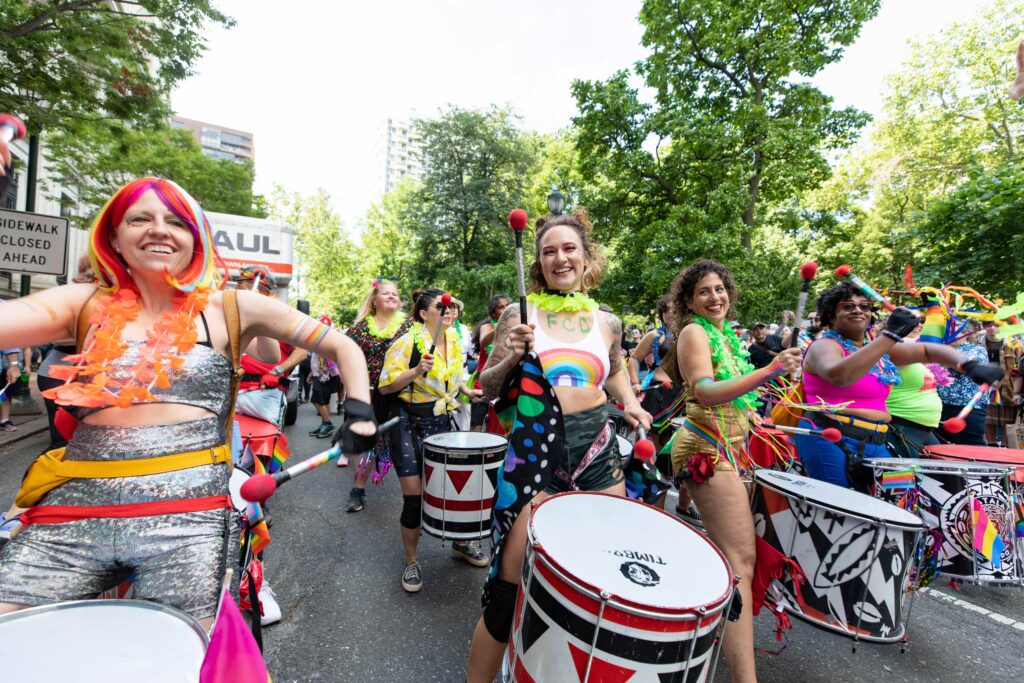
Pride month opened with the “Love, Light, and Liberation” March, organized by galaei, the organization behind last year’s Pride march and festival. At the rally, speakers included Rue Landau, who has since been elected as the first queer councilmember of Philadelphia’s city council. Jazmyn Henderson of ACT UP and Reverends Andrea Lamour-Harrington and Jeffrey Jordan of Whosoever Metropolitan Community Church of Philadelphia also addressed those gathered.
The march commenced when dozens of participants opened a 200-foot long Pride flag — the largest in Pennsylvania’s history — and displayed it as they led a walk toward the Pride festival, also organized by galaei. It featured DJs, youth and family activities — like bounce houses and a dunk tank, sober spaces, quieter nooks for those who might get overstimulated or need a break, harm-reduction and safe-sex resources, and information about the history of Pride.
This year’s festival reflected last year’s recapturing of a more community-driven approach, with queer-specific organizations participating as vendors and partners rather than corporate sponsors. This shift was made possible after Philly Pride Presents, which had previously organized events, disbanded. It had been heavily scrutinized for a lack of queer-competency, events and partnerships that don’t reflect the community, and strong collaborations with police.
Throughout the month, continued celebrations were hosted by the Philadelphia Orchestra, which offered a free concert; William Way LGBT Community Center, which hosted a dog-themed silent auction; the University of Pennsylvania, which published an anthology of works by trans writers; galaei, which held a prom for queer youth; and Philadelphia Freedom Band, which performed a Solstice concert.
Visit Philly featured drag artists in campaign
Visit Philly featured Drag Queen Storytime in a commercial to promote the city as an “an open and inclusive destination.”
The 30-second commercial features Philadelphia queens Brittany Lynn and Morgan Wells, reading to children and their parents outside of the National Constitution Center. Together, they read the book “Giraffes Can’t Dance,” which follows Gerald the giraffe — who wasn’t sure how to dance when his community gathered for an event. Through the support of a new friend, he learns to trust his authenticity and dance proudly.
The pair dressed in whimsical, colorful outfits perfect for sparking kids’ imaginations. Brittany Lynn wore a textured, red bubble dress with detached flowing sleeves. Morgan Wells donned a structured dress made of a graffiti-style fabric with a motif of candy, smiley faces and comic book exclamations — like, “Bam!” A playful headpiece made it look like ideas were swirling around above their head.
Brittany Lynn said that visibility matters, explaining, “It’s the same thing with Drag Queen Storytime. It lets people know that they can be their true self — no matter how they want to present themselves to the world — and that’s okay.”
At least 15 pieces of legislation that attempt to label drag events as “adult entertainment” were introduced this year, leading to drag bans and restrictions across the country. The commercial ended with the slogan, “In Pursuit of a More Perfect Union,” with the words “kind” and “respectful” added too.
Moms for Liberty came to town
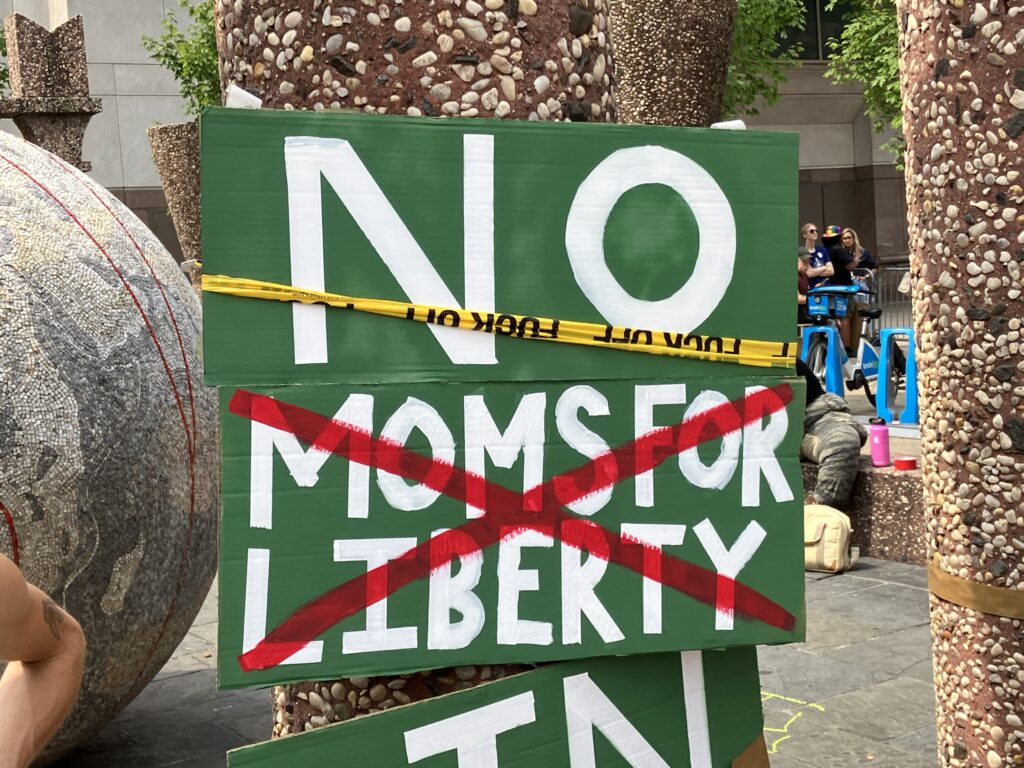
Moms for Liberty, a right-wing political organization that gained attention in 2022 for infiltrating school boards across the US, ties one of this year’s biggest stories back to last year’s stories of the year. In 2023, the group held their national summit in Philadelphia. They were hosted by the city’s downtown Marriott and the Museum of the American Revolution — which both drew criticism for welcoming the group.
Protests in response to the summit were made possible by a collaboration between a variety of advocacy groups and were well-attended by representatives of the city and state government, local LGBTQ+ leaders, individual activists, and concerned community members. ACT UP organized a weekend of events to respond to M4L’s hateful rhetoric with acts of joyful resistance — including a dance party and children’s activities. Trans Pride flags were placed by the city on light poles in front of the hotel.
On the final morning of demonstrations, five protestors were arrested for failure to disperse while blocking a roadway in front of the hotel. Additionally, police arrested a trans woman who was waving a trans Pride flag over a barricade placed outside the hotel even though she was still on Marriott’s property.
Best known for their hyperbolic campaigns to ban books and curriculum, Moms for Liberty also coordinates political efforts during school board elections, opposes policies that affirm marginalized and LGBTQ+ students, and promotes other censorship. The group, which has chapters in at least 27 counties in Pennsylvania, is tied to book bans across the state. Pennsylvania now ranks fifth in the country for most banned books.
Josh Kruger was murdered
Josh Kruger, a 39-year-old gay man, was shot to death in his Point Breeze home on Oct. 2, 2023.
Kruger, who was a freelance journalist at the time of his death, often focused on LGBTQ+ issues and advocated for marginalized people in his work — including essays that explored his own experiences, such as living with HIV. He previously worked for the City of Philadelphia, managing the mayor’s social media platforms and policy campaigns. Kruger, who experienced homelessness in the past, had also acted as the communications director and spokesperson for the city’s Office of Homeless Services.
Drugs may have played a role in his relationship with his alleged assailant, Robert Davis. Davis’s family believed he was in a long-term, intimate relationship with Kruger and asserted that Kruger threatened to post sexually explicit videos of Davis online before the murder occurred. Ernest Owens, a local journalist who is Black and gay, took to social media to say he wasn’t surprised to hear these accusations, adding, “This is unfortunate, but we need to address the ways white gay men terrorize Black and brown queer bodies.”
Kruger’s friends defended him, highlighting that they too could speculate a motive — including that internalized homophobia could have led to the violence. They also believe Kruger didn’t deserve to die, even if he wronged his alleged killer.
An ongoing investigation will hopefully provide the community with answers. Asa Khalif, a community advocate, told PGN, “I’m not excusing the murder of Josh Kruger at all. But if the allegations of sexual abuse are true, Robert Davis is also a victim as well.”
The city experienced its first OURfest
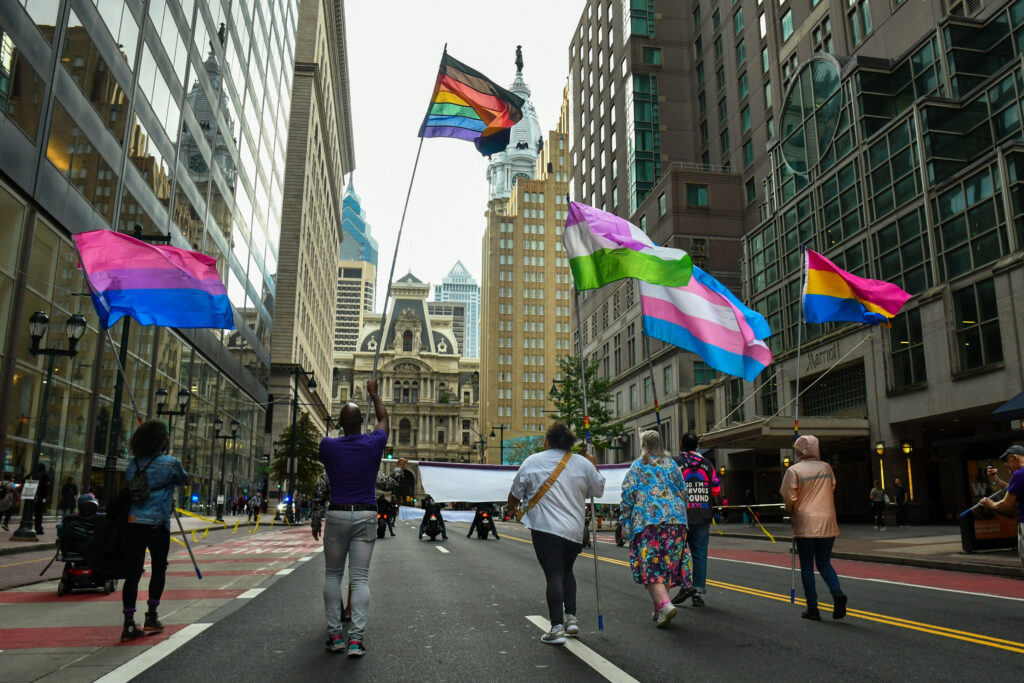
A weekend of events was organized by galaei for National Coming Out Day on Oct. 7-8 as part of their Pride 365 initiative. The events, dubbed OURfest — which stands for “our uniting resilience,” included a resource fair, festival and parade.
The festival and resource fair took place in the heart of the Gayborhood. Queer-specific organizations and those that affirm and support queer people were present to connect those in need with health care, housing and employment resources, and a variety of other services. A medical tent with healthcare professionals and therapists was available. An adults-only area was dedicated to education about sexual wellness, including workshops on kink and consent and complimentary safe-sex items.
Youth and family programming was also offered, including bounce houses, game trucks, family resources, chest feeding and changing stations, and other opportunities. A decompression zone was developed in partnership with Disability PA for folks of all ages who needed a break.
Entertainers captivated crowds with acts on multiple stages. KiKi Alley provided space for the city’s ballroom performers to share their art and showcase their skills, and a space was dedicated to Afro-Latinx heritage.
The parade featured themed floats — including Out in Youth, Out in Community, Out in Career, Out in Culture and Out in Sports. Musicians, drag performers, community leaders and organizers marched and rode on floats. A 200-foot rainbow flag was carried, inspiring queer and trans joy.
Next year, expect the event to return. Tyrell Brown, galaei’s executive director, said it will be back at an even bigger scale!
LGBTQ+ candidates won elections
It was an election year, and the surrounding region saw many LGBTQ+ victories in the suburbs and major cities. Philadelphia celebrated two historic wins.
Rue Landau, who identifies as a lesbian and queer, is the first openly LGBTQ+ person to be elected to Philadelphia’s city council. Before her campaign, Landau was most recently the Director of Law and Policy at the Philadelphia Bar Association.
Councilmember-elect Landau is known for her commitment to serving and centering the most marginalized Philadelphians with her work as a civil rights advocate. She previously served as the executive director of the Philadelphia Commission on Human Relations and Fair Housing Commission, where she helped to ban discrimination based on sexual or romantic orientation and gender identity in Philadelphia and championed other bills that affect LGBTQ+ people.
Chesley Lightsey, who is a lesbian, was the first Philadelphian to campaign for judge as an openly queer person. Although other LGBTQ+ judges have and will continue to serve on the Philadelphia Court of Common Pleas alongside Lightsey, she was the first to openly share about her identity and family on the campaign trail.
As a prosecutor working on homicide cases, judge-elect Lightsey supported the families and communities of victims. While working in the District Attorney’s Office, she reevaluated life sentences given to minors convicted of homicide. With an impartial approach to leadership, she sought to balance the needs of victims and the belief that people have the capacity for growth.
As a judge, Lightsey will preside over non-homicide criminal trials. She acknowledged that some queer people may not feel safe or supported in the courtroom and have endured discrimination in the past. She also recognized that showing up to court is difficult for all marginalized participants and wants to be especially respectful of people’s time, financial needs and emotional labor.
